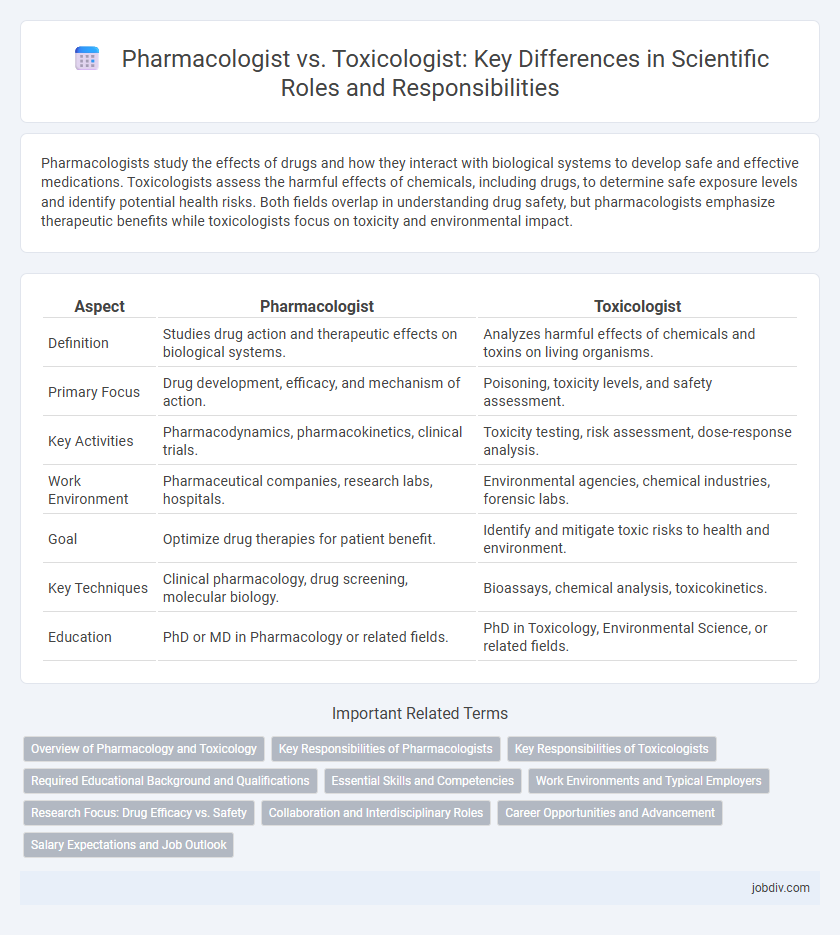Pharmacologists study the effects of drugs and how they interact with biological systems to develop safe and effective medications. Toxicologists assess the harmful effects of chemicals, including drugs, to determine safe exposure levels and identify potential health risks. Both fields overlap in understanding drug safety, but pharmacologists emphasize therapeutic benefits while toxicologists focus on toxicity and environmental impact.
Table of Comparison
| Aspect | Pharmacologist | Toxicologist |
|---|---|---|
| Definition | Studies drug action and therapeutic effects on biological systems. | Analyzes harmful effects of chemicals and toxins on living organisms. |
| Primary Focus | Drug development, efficacy, and mechanism of action. | Poisoning, toxicity levels, and safety assessment. |
| Key Activities | Pharmacodynamics, pharmacokinetics, clinical trials. | Toxicity testing, risk assessment, dose-response analysis. |
| Work Environment | Pharmaceutical companies, research labs, hospitals. | Environmental agencies, chemical industries, forensic labs. |
| Goal | Optimize drug therapies for patient benefit. | Identify and mitigate toxic risks to health and environment. |
| Key Techniques | Clinical pharmacology, drug screening, molecular biology. | Bioassays, chemical analysis, toxicokinetics. |
| Education | PhD or MD in Pharmacology or related fields. | PhD in Toxicology, Environmental Science, or related fields. |
Overview of Pharmacology and Toxicology
Pharmacology studies the interactions between drugs and biological systems to understand therapeutic effects and mechanisms of action. Toxicology examines the harmful effects of chemicals, including drugs, on living organisms and assesses risk and safety. Both fields utilize biochemical, molecular, and physiological approaches to evaluate compound behavior, but pharmacology emphasizes efficacy, while toxicology prioritizes toxicity and exposure assessment.
Key Responsibilities of Pharmacologists
Pharmacologists primarily focus on studying the effects and mechanisms of drugs on biological systems, designing experiments to evaluate drug efficacy, safety, and interactions. They analyze pharmacokinetics and pharmacodynamics to optimize therapeutic outcomes and minimize adverse effects. Their responsibilities include drug development, clinical trial oversight, and providing scientific data to support regulatory approval processes.
Key Responsibilities of Toxicologists
Toxicologists primarily evaluate the adverse effects of chemicals, drugs, and environmental agents on living organisms by conducting risk assessments and dose-response analyses. They design and implement safety protocols and toxicological studies to determine toxicity thresholds and exposure limits. Their work supports regulatory compliance and product safety by identifying harmful substances and advising on hazard mitigation strategies.
Required Educational Background and Qualifications
Pharmacologists typically require a doctoral degree (Ph.D. or Pharm.D.) in pharmacology, pharmaceutical sciences, or related fields, with extensive training in drug action, clinical trials, and molecular biology. Toxicologists often hold advanced degrees (M.S. or Ph.D.) in toxicology, chemistry, or biochemistry, emphasizing the study of toxic substances, risk assessment, and environmental health. Both professions demand strong foundations in biology, chemistry, and laboratory skills, while certifications like the American Board of Toxicology credential enhance career prospects for toxicologists.
Essential Skills and Competencies
Pharmacologists require strong analytical skills and a deep understanding of drug mechanisms, pharmacokinetics, and pharmacodynamics to evaluate drug efficacy and safety. Toxicologists must possess expertise in toxicological assessment, risk analysis, and the ability to interpret toxic substance interactions within biological systems. Both fields demand proficiency in laboratory techniques, data interpretation, and regulatory knowledge to ensure accurate research and compliance with safety standards.
Work Environments and Typical Employers
Pharmacologists primarily work in pharmaceutical companies, research institutions, and academic settings focused on drug development and therapeutic efficacy. Toxicologists are commonly employed by regulatory agencies, environmental organizations, and chemical manufacturing firms to assess the safety and hazards of substances. Both professions often collaborate in laboratories and clinical environments, emphasizing experimental and analytical safety evaluations.
Research Focus: Drug Efficacy vs. Safety
Pharmacologists primarily investigate drug efficacy, examining how medications interact with biological systems to produce therapeutic effects and optimize dosage regimens. Toxicologists focus on drug safety, assessing adverse effects, toxicity levels, and the mechanisms underlying harmful reactions to prevent potential health risks. Both disciplines utilize in vitro and in vivo models to generate data essential for drug development and regulatory approval processes.
Collaboration and Interdisciplinary Roles
Pharmacologists and toxicologists collaborate closely in drug development to ensure both therapeutic efficacy and safety by integrating pharmacokinetic and toxicodynamic data. Their interdisciplinary roles involve combining expertise in molecular biology, chemistry, and clinical research to assess drug interactions and adverse effects comprehensively. This collaboration accelerates the translation of laboratory findings into safe and effective medical treatments.
Career Opportunities and Advancement
Pharmacologists specialize in drug development and therapeutic effects, offering career opportunities in pharmaceutical companies, research institutions, and regulatory agencies with advancement into senior research or clinical roles. Toxicologists focus on studying harmful effects of chemicals on living organisms, working in environmental agencies, public health sectors, and industry safety departments, often advancing to positions in risk assessment and regulatory compliance. Both fields require strong analytical skills, with rising demand for experts in drug safety and environmental health driving career growth and interdisciplinary collaboration.
Salary Expectations and Job Outlook
Pharmacologists typically earn a median salary of around $95,000 annually, reflecting their expertise in drug development and therapeutic applications, while toxicologists have a similar median salary near $88,000 but often see variations based on their specialized roles in safety assessment and environmental impact analysis. Job outlook for pharmacologists shows an expected growth rate of about 6% over the next decade due to increased demand for new medications and clinical trials, whereas toxicologists face a growth rate close to 8%, driven by expanding regulatory requirements and public health concerns. Both professions require advanced degrees and offer opportunities in pharmaceutical companies, government agencies, and research institutions with competitive compensation linked to experience and specialization.
Pharmacologist vs Toxicologist Infographic

 jobdiv.com
jobdiv.com